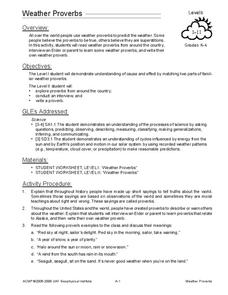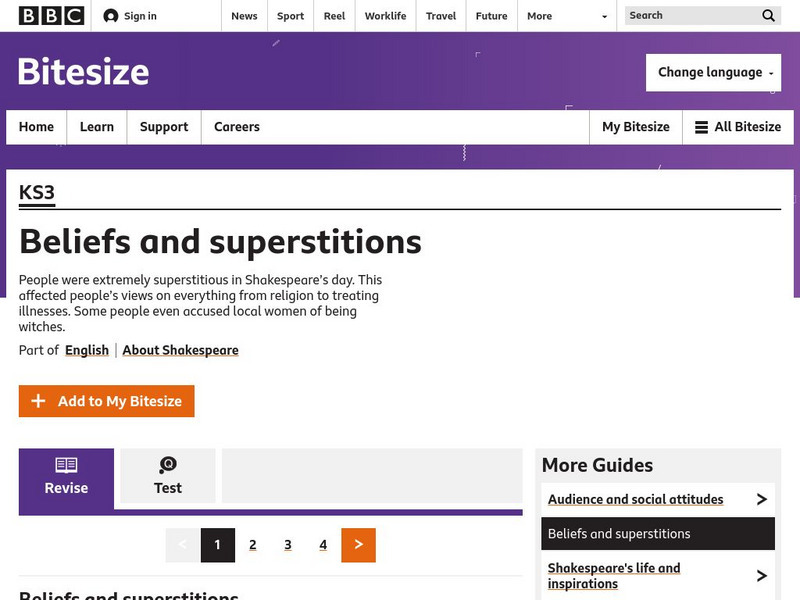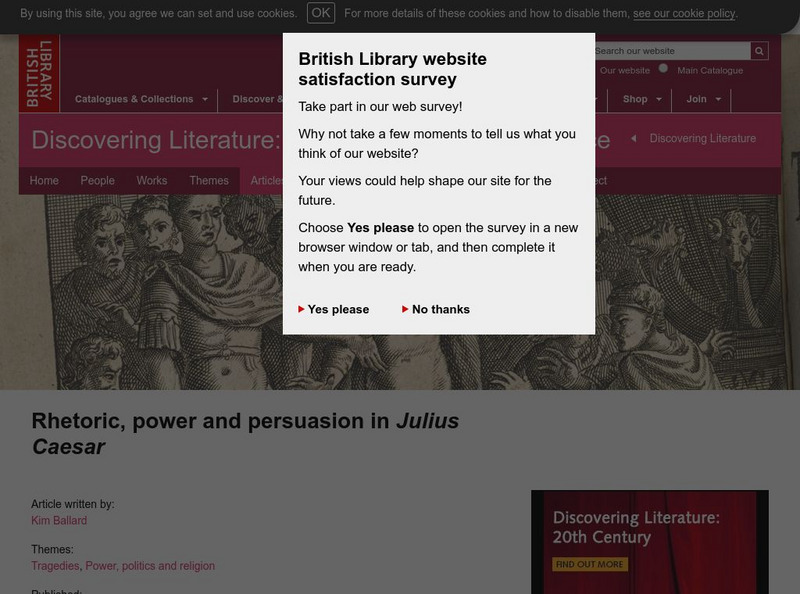Curated OER
Cats and Superstition: Fun Trivia Quiz
Answers to this quiz are very well cited, so if your class is studying Halloween, symbols, superstition, world cultures, or cats, it could spark spirited discussion about comparative traditions.
Curated OER
Weather Proverbs
Your class explores weather proverbs and superstitions from around the country and writes their own proverb about weather. They interview community elders to learn proverbs about Alaska and its weather. Then they discuss several example...
Curated OER
On the Other Hand
In this personal characteristics activity, students, with a partner, discuss the unusual characteristics that four famous people have in common and start a conversation with seven main questions about left-handed people.
Curated OER
The Only Superstitious Person Is Huck Finn
Fourth graders interview people from three different age groups about superstition including what they believe and why they believe it. This instructional activity goes along with the classic book, The Adventures of Huckleberry Finn.
Curated OER
Fact Or Fiction
Pupils demonstrate their ability to distinguish between fact and fiction. Students identify the features of weather-related adages and proverbs. After reviewing several weather adages, pupils explain whether they are based in fact.
Curated OER
Facts, Feats and Folklore: Spiders
Students review and discuss a variety of sayings, folklore and superstitions about spiders. They discuss this information and choose either an interesting fact or appealing foklore tradition to illustrate.
Curated OER
Cartoons for the Classroom: Don't Get It? You're Not Alone
In this historical events worksheet, students analyze a political cartoon from the 1700's and one from the 1900's . Students respond to 2 short answer questions.
Curated OER
Hic-Hic-Hooray!
What is really the best way to get rid of hiccups? Investigate some old wives' tales and folk remedies related to health. Middle schoolers explore the science behind why people might believe these myths to be true and find the real...
Curated OER
"Cures" Chart
Students chart the "cures" for people with disabilities. In this disabilities instructional activity, students compare and contrast the care and treatment of people with disabilities in the past and present. Students write accurate...
Curated OER
Juliius Caesar
Students discuss suggestive language and the use of symbols and foreshadowing in Shakespeare's plays. In this Julius Caesar lesson, students discuss the idea that men control their own fates. Students examine the words of...
Curated OER
The Ocean: A Watery World
Students discuss the proper clothing for the season. They make wind chimes to use as an indicator of movement of the air and observe and identify the various cloud formations. They determine the basic rules of storm safety and discuss...
Curated OER
Voices of Louisiana Worksheet
In this voices of Louisiana worksheet, learners choose at least three quotations from the Voices of Louisiana webpage and look for clues about each person's folk groups and the genres they mention; for example, oral tradition, folk...
Curated OER
Learning Festival
Fifth graders at this age are very interested in the adventures of knighthood and life in the past, so the unit will serve as a basis for teaching skills while maintaining high interest.
Curated OER
Fungal History
Middle schoolers identify different types of fungi. They discuss how mushrooms are used in American culture and research an issue about a type of fungi. They share their information with the class.
Curated OER
Catch As Catch Can
Learners capture and observe insects. Using provided netting, students design and create a butterfly net. They study many types of insects and their benefits. After identifying insects caught, learners complete a graph. Students write...
Curated OER
Catch as Catch Can
Students investigate insects. For this insect analysis lesson, students catch insects using nets they make. They identify the insects they catch and create a chart to show the numbers and varieties. This lesson includes a vocabulary list...
Other
Spirit Science: 25 Common Superstitions and Their Origins
The historical origins of common superstitions are explained in text and video.
Other
Psychic Library: Superstition Room
Detailed descriptions of the origins of some common superstitions.
Other
Elizabethan England Life: Elizabethan Superstitions
Lists common superstitions in Elizabethan England.
Other
Origins of Popular Superstitions [Pdf]
Describes the origins of some common superstitions that have survived the centuries.
Other
Luther College: Magic and the Common People of Early Modern Europe
Examines the role that superstition and a belief in magic played in people's lives in early modern Europe.
Other
St. Ives Historical Society: Superstitions of the Elizabethan Era [Pdf]
Describes some superstitions that people had during Elizabethan times.
BBC
Bbc: Ks3 Bitesize: Beliefs and Superstitions
Looks at some of the superstitions that were common in Shakespeare's time.
British Library
British Library: Rhetoric, Power and Persuasion in Julius Caesar
This article discusses the use of rhetoric in The Tragedy of Julius Caesar and the young Shakespeare's likely education in the art of rhetoric. In Julius Caesar, rhetoric is used to exert power over the commoners, to recruit...



















![Origins of Popular Superstitions [Pdf] Article Origins of Popular Superstitions [Pdf] Article](https://d15y2dacu3jp90.cloudfront.net/images/attachment_defaults/resource/large/FPO-knovation.png)


